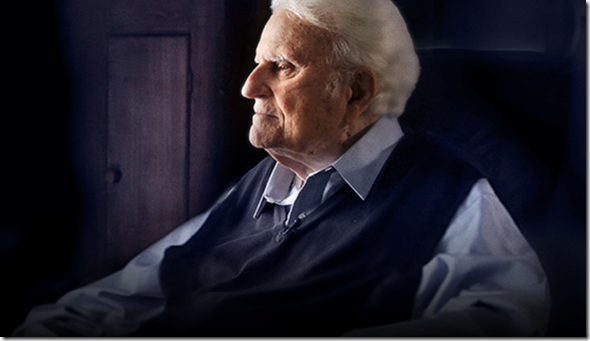
Learning From Billy’s Regrets
 When I was a little boy growing up in Alabama there were two names that were iconic in our household: Mickey Mantle and Billy Graham. This was in the early 60’s when Mantle was at his height, hitting 500 foot home runs with regularity.
When I was a little boy growing up in Alabama there were two names that were iconic in our household: Mickey Mantle and Billy Graham. This was in the early 60’s when Mantle was at his height, hitting 500 foot home runs with regularity.
It was also before we moved to Maryland, I became an Orioles fan, and I learned that the Yankees were in reality the Evil Empire. But Mantle had retired by then, so he remained unsullied in my mind.
It was also the time that Billy Graham was at his height. Throughout the 50’s he held huge evangelistic meetings in large arenas and stadiums, attracting thousands. He ended each service with an invitation to come forward to receive Christ, something started by D.L. Moody and so common now in evangelical churches that most people are surprised to learn that it is a recent innovation in Christianity that is not practiced by most churches around the world today or any churches through most of church history .
It was also when television was transforming American society, and Graham was one of the first to take advantage of it as a medium for communicating the Gospel. Of course no one back then, Graham included, realized the way that TV shapes—and all too often distorts—the message. Nor could he foresee the way that others would use “Christian” TV to deceive the masses and enrich themselves. One of the things that I have always respected about Billy Graham was his integrity. He sincerely wanted to use the influence of television to authentically communicate the Gospel and not for personal gain.
Not that he was immune to the temptations of fame and and personal influence. Graham was known as the Pastor to the Presidents for his close relationships with Dwight Eisenhower and Richard Nixon. The close proximity to that kind of power and influence is intoxicating, and its easy to drink deeply and become blind to the way that politicians can and do use prominent religious people. Pictures of Graham and Nixon gave Christian legitimacy to Nixon as a person but also to his policies.
Then Watergate happened, and Nixon was revealed to be duplicitous, vile, paranoid and manipulative. And Graham—and to some extent the preaching of the Gospel—was tarnished by the association.
Graham, however, wasn’t so seduced by political power that he was unable or unwilling to learn from his mistakes. Once again, his integrity allowed him to learn and to change. Christianity Today last week published an online series of articles on Billy Graham, and in one, “What I Would Have Done Differently,” he is quoted as saying,
“I don’t go to Washington much, and I don’t go to the Hill much. I used to have lots of friends that I’d go back and see—congressmen and senators—but for years I haven’t done that. I just don’t want to go. I feel God has called me to a much higher calling.
“I came close to identifying the American way of life with the kingdom of God,” Graham told Christianity Today more than 10 years after Nixon resigned. “Then I realized that God had called me to a higher kingdom than America. I have tried to be faithful to my calling as a minister of the gospel.”
Evangelical leaders have gotten away from Graham’s example and have not learned from his regrets. Many are drinking deeply from the cup of political power and their proximity to Washington, but I fear that they lack the same strength of character and personal integrity that Graham possessed.
I fear that they won’t realize that they are being used, and even when they get burned, as they inevitably will, that they won’t be able to even recognize that the smoke they are smelling is coming from them.
I see them compromising, not only their integrity, but that of the Gospel and the kingdom of God, and not having the self-awareness to recognize it and to change.
The passing of Billy Graham last week at age 99 represents the passing of an era. In some ways that was inevitable; society is always changing, and this sure isn’t the 1960’s. But there are parts of his legacy that we would do well to continue, and this is surely one of them.
 I am a lifelong student of the Bible, and have been a pastor for over twenty-five years. My desire through this blog is to help people see things in the intersection of Scripture and real life that they might have missed. The careless handling of the Bible is causing a lot of problems in our churches and our culture--and is literally turning people away from the church, and, sometimes, God. I hope to treat Scripture with the respect it deserves, and, even if you don't agree with what I say, give you some insight.
Feel free to leave a comment. I promise to respond to you. All I ask is that you be respectful in your comments.
I am a lifelong student of the Bible, and have been a pastor for over twenty-five years. My desire through this blog is to help people see things in the intersection of Scripture and real life that they might have missed. The careless handling of the Bible is causing a lot of problems in our churches and our culture--and is literally turning people away from the church, and, sometimes, God. I hope to treat Scripture with the respect it deserves, and, even if you don't agree with what I say, give you some insight.
Feel free to leave a comment. I promise to respond to you. All I ask is that you be respectful in your comments. 
Connect with Me